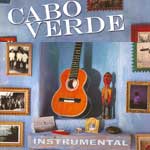Perhaps the most unusual of these new reissues is this 2-CD set of instrumental music, spanning the late-60s right up to recent years. At its best, this compilation offers effervescent string jams full of jaunty guitar riffs and chattering cavaquinhos, also gushing piano mornas, weeping and wailing violins, and some great woodwinds playing, including the eloquent clarinet of Luis Morais, and a saxophone-driven coladera, “Muvimente,” by Totinho. Coladera is the archipelago’s principle couples dance style, featuring with violins in the ‘30s, and moving on to brass and eventually synthesizers. CD 1 opens with a 16-minute, 1970 coladera medley by Humberto & Toy that is probably the standout track of the whole compilation. It culminates in an ecstatic swirl of string play that attains the spontaneous energy of a classic jazz jam without ever losing its down home folksiness—pure gold!
Sometimes the less polished tracks have the most charm, as with Malquias Costa’s winningly creaky violin work on “Esperença,” or Voz de Cabo Verde’s clarinet feature with spare string backing, “Dispidida P’Angola,” which has a fragile, vintage beauty. On the other hand, when polish comes in the hands of a tight string combo like the Mindel Band, or better still the guitar/cavaquinho/violin maker and virtuoso Bau, the results are always delightful. Because this set covers such a long period of time, we hear the coming and going of various crazes and production styles. Voz de Cabo Verde’s 1968 “Quem Tem Odio” features a trumpet, and has the buoyancy and flair of a Tijuana Brass number from roughly the same era. It sounds surprisingly fresh four decades later. By contrast, “Regresso,” the 1990 Luis Morais track that follows sounds equally jolly, but far more dated owing to the tacky drum machine rhythm track. Overall, the hits far outnumber the misses on this unusual instrumental survey of one of West Africa’s most distinctive musical niches.
-Banning Eyre








